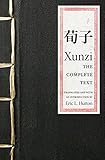Xunzi : The Complete Text / Xunzi; Eric L. Hutton.
Material type: TextPublisher: Princeton, NJ : Princeton University Press, [2014]Copyright date: ©2014Edition: Course BookDescription: 1 online resource : 1 line illusContent type:
TextPublisher: Princeton, NJ : Princeton University Press, [2014]Copyright date: ©2014Edition: Course BookDescription: 1 online resource : 1 line illusContent type: - 9780691161044
- 9781400852550
- 181.112 23
- online - DeGruyter
- Issued also in print.
| Item type | Current library | Call number | URL | Status | Notes | Barcode | |
|---|---|---|---|---|---|---|---|
 eBook
eBook
|
Biblioteca "Angelicum" Pont. Univ. S.Tommaso d'Aquino Nuvola online | online - DeGruyter (Browse shelf(Opens below)) | Online access | Not for loan (Accesso limitato) | Accesso per gli utenti autorizzati / Access for authorized users | (dgr)9781400852550 |
Frontmatter -- Contents -- Acknowledgments -- Introduction -- A Traditional Timeline of Early Chinese History -- Chapter 1: An Exhortation to Learning -- Chapter 2: Cultivating Oneself -- Chapter 3: Nothing Improper -- Chapter 4: On Honor and Disgrace -- Chapter 5: Against Physiognomy -- Chapter 6: Against the Twelve Masters -- Chapter 7: On Confucius -- Chapter 8: The Achievements of the Ru -- Chapter 9: The Rule of a True King -- Chapter 10: Enriching the State -- Chapter 11: The True King and the Hegemon -- Chapter 12: The Way to Be a Lord -- Chapter 13: The Way to Be a Minister -- Chapter 14: On Attracting Men of Worth -- Chapter 15: A Debate on Military Affairs -- Chapter 16: The Strong State -- Chapter 17: Discourse on Heaven -- Chapter 18: Correct Judgments -- Chapter 19: Discourse on Ritual -- Chapter 20: Discourse on Music -- Chapter 21: Undoing Fixation -- Chapter 22: Correct Naming -- Chapter 23: Human Nature Is Bad -- Chapter 24: The Gentleman -- Chapter 25: Working Songs -- Chapter 26: Fu -- Chapter 27: The Grand Digest -- Chapter 28: The Right-Hand Vessel -- Chapter 29: The Way to Be a Son -- Chapter 30: The Proper Model and Proper Conduct -- Chapter 31: Duke Ai -- Chapter 32: Yao Asked -- Appendix 1: Important Terms and Names -- Appendix 2: Cross-Reference List -- Textual Notes -- Bibliography -- Index
This is the first complete, one-volume English translation of the ancient Chinese text Xunzi, one of the most extensive, sophisticated, and elegant works in the tradition of Confucian thought. Through essays, poetry, dialogues, and anecdotes, the Xunzi presents a more systematic vision of the Confucian ideal than the fragmented sayings of Confucius and Mencius, articulating a Confucian perspective on ethics, politics, warfare, language, psychology, human nature, ritual, and music, among other topics. Aimed at general readers and students of Chinese thought, Eric Hutton's translation makes the full text of this important work more accessible in English than ever before.Named for its purported author, the Xunzi (literally, "Master Xun") has long been neglected compared to works such as the Analects of Confucius and the Mencius. Yet interest in the Xunzi has grown in recent decades, and the text presents a much more systematic vision of the Confucian ideal than the fragmented sayings of Confucius and Mencius. In one famous, explicit contrast to them, the Xunzi argues that human nature is bad. However, it also allows that people can become good through rituals and institutions established by earlier sages. Indeed, the main purpose of the Xunzi is to urge people to become as good as possible, both for their own sakes and for the sake of peace and order in the world.In this edition, key terms are consistently translated to aid understanding and line numbers are provided for easy reference. Other features include a concise introduction, a timeline of early Chinese history, a list of important names and terms, cross-references, brief explanatory notes, a bibliography, and an index.
Issued also in print.
Mode of access: Internet via World Wide Web.
In English.
Description based on online resource; title from PDF title page (publisher's Web site, viewed 23. Mai 2019)


